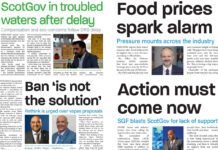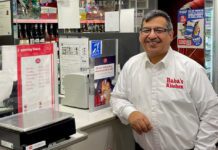Excel Vending boss John MacDonald says retailers could make money if deposit return is done right
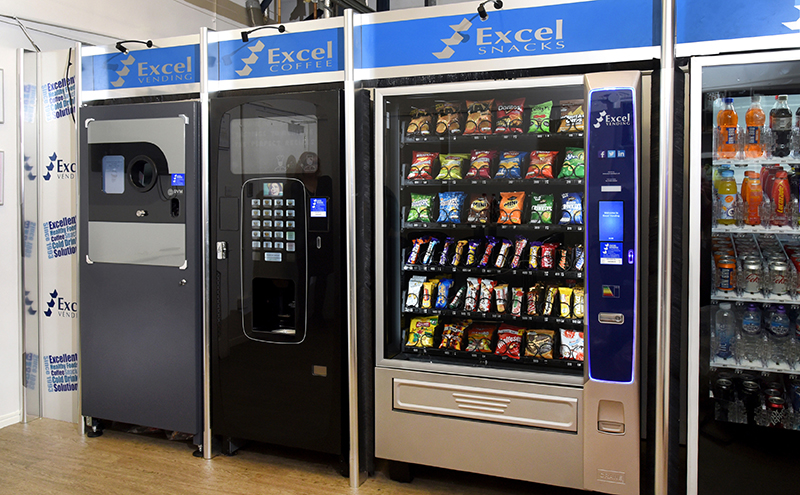
TO say the Scottish Government’s proposed deposit return scheme has been controversial with c-store retailers is a bit like saying grass is green, not least of all because the policy was announced without any clear vision of how such a scheme could work in smaller shops.
While floor space isn’t so much of an issue for the big multiples, small independent retailers need to make every inch of their store count, but to not have DRS could see retailers miss out on footfall.
However, John MacDonald, director of Excel Vending in East Kilbride, reckons he has a DRS solution that’s not only compact, but could also be a bit of a money spinner for stores.
Excel Vending entered the deposit return game close to two years ago – well before the First Minister announced the Scottish Government’s intention to introduce a scheme last autumn – with the belief that a reverse vending machine for plastic and aluminium drinks containers could be self sustaining in and of itself.
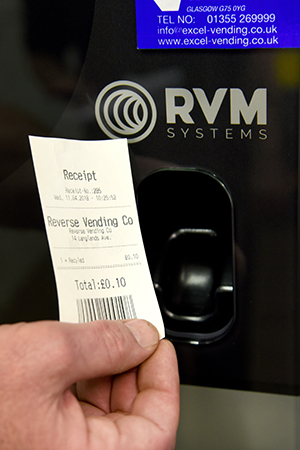
John MacDonald explained: “We got involved in this before we knew anything about a deposit return scheme. We saw the concept of it and decided to bring the machine in and sell it to universities and things like that to allow them to collect plastic bottles.”
Described by John as the “Rolls Royce” of reverse vending machines, the RVM Systems machine on display at Excel Vending was developed in Norway and Finland and is in use on the other side of the North Sea as part of deposit return schemes similar to proposals being discussed in Scotland at the moment.
And compared to some of the behemoths out there on the market, it’s a fairly compact solution.
Around the size of a coffee-to-go unit, MacDonald reckons his machine could work well in convenience; the entire unit stands at 1.8m high, 750mm wide and 800mm deep.
It’s an opinion some retailers also share, according to John, who was visited by a delegation from the NFRN last year.
“We had the NFRN in because they were thinking to themselves, ‘a huge big DRS machine, where are we going to fit that in?’, but when I showed them this it was like ‘wow, that’s better’.”
It might be compact, but size isn’t the only concern for retailers, particularly if they’re going to be landed with a complicated new piece of kit.
According to John, while the technology behind RVM’s machine might be cutting edge, things are simple from the retail end.
The machine works in a similar fashion to most others. Customers place an empty plastic bottle or drinks can through a hole on the front of the machine onto a conveyor belt.
The conveyor belt is where the tech kicks in.
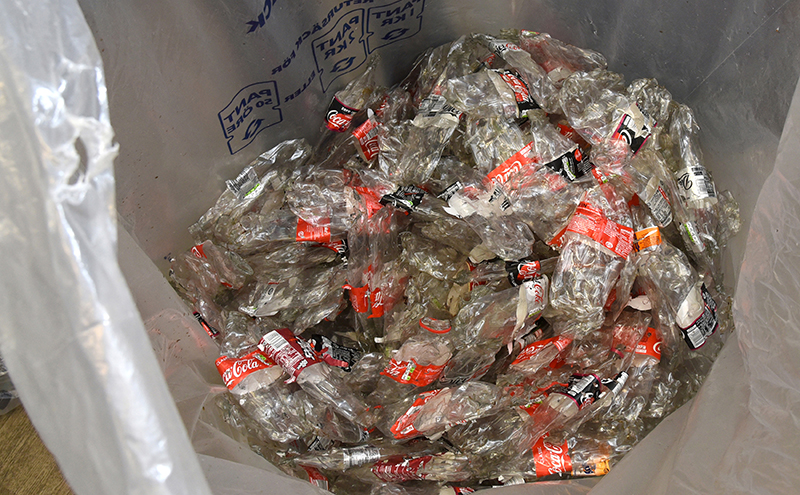
Not any ordinary belt, the conveyor has a built-in scale as well as a 360º infrared scanner which reads the barcode and scans the packaging to determine the material.
In this way, the machine can see whether a bottle is empty or not, what material the packaging is made from, and what SKU is coming back.
Should a customer place an empty PET bottle or aluminium can into the machine that is recognised by the DRS system’s central database, the pack is accepted and dropped into a crusher.
The crusher is key to keeping storage space down and vital to fraud prevention according to John.
“What happens is once the machine is happy with the bottle it will take it through, it drops into a heavy duty commercial crusher which has got teeth on it which scarify the bottle – which aids in fraud prevention.
Maybe year one he might break even but year two and three he’ll actually start to make money out of it.
“In some schemes fraud is rife because the machine doesn’t compact the bottle.”
Once crushed and scarified, a bottle can no longer be accepted by an RVM machine so should, for example, a staff member attempt to pass a returned bottled through a second time, the machine would reject the packaging.
At the end of the process a receipt is printed, which the customer can use to claim their deposit back in store.
This process doesn’t just save on space – the RVM machine at Excel Vending has internal capacity for 500 plastic bottles plus 600-700 cans – it also produces high-quality recyclable material. That material is worth money, which is good news for retailers according to John.
“Gold is worth a lot of money, one because it’s shiny and two because it’s a rare material. These bottles in a recycled form are a rare material because, at the moment, bottles are very difficult to recycle in the UK.
“If you picture it, we’re bailing up poor quality plastic and sending it off to China but once we start to recycle it this way you get bags and bags that become a commodity.
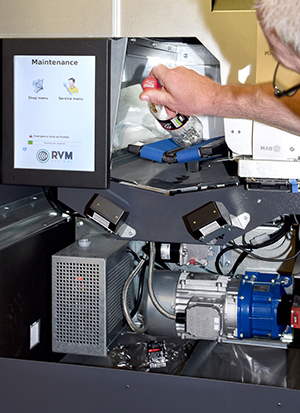
“If you take the likes of the Norwegian and Swedish models, what happens is the shopkeeper leases the machine and pays a rental, but the government administration pay him floor space rental, then they pay him a handling charge.
“So maybe year one he might break even but year two and three he’ll actually start to make money out of it.”
Whether a handling fee for retailers will be introduced in Scotland is still up in the air as Zero Waste Scotland and its DRS steering committee, which includes Excel Vending, continue to discuss and debate the issue.
Other questions still up in the air include how returned bottles will be collected from store, although John reckons his machine can make this process straight forward too.
“These machines count everything. So once it reaches say 350 bottles an alert can go out to a collection company to say ‘machine number 1111, collect it within the next two weeks’.
“The shopkeeper doesn’t have to do anything.”
Whatever system the Scottish Government elects to apply once DRS is implemented, it will be shaped by discussions occurring now.
If retailers want to get some hands on experience with Excel Vending’s machine, John said they are more than welcome to pay him a visit.
“Even if you’re completely opposed to DRS, anti-this and anti-that, retailers are still welcome to come in. They can still phone us and make an appointment and come in and see the machine, it’s an education.”




